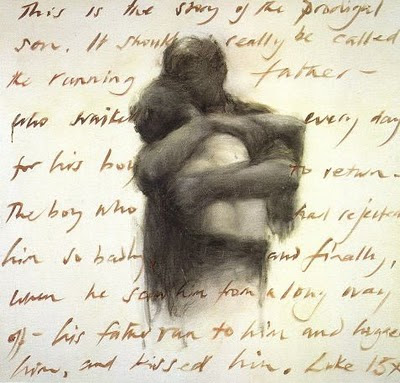The Prodigal in Us
On a dusty, long day in the field the father of the prodigal son looks up from his plow and sees a silhouette on the horizon. The oldest son approaches and asks, “Were we expecting guests tonight?” “No son, not tonight.” “Well who do you think that may be?” And in a relieved breathe the father says, “He’s alive; he’s come home!”
With haste the father breaks through the field lines, jumps the fence, heads for the street, runs to his boy, and filled with compassion, embraces his boy with a holy hug. All the brokenness, all the shame, all the hurt that boy was carrying is gone.
Forgiven.
Forgotten in the beauty of the compassionate embrace.
The holy hug.
Immediately the father retrieves his royal robe, rings, and kills the fattened calf and prepares a feast for the prodigal son’s honor.
Returning home, returning to the presence of God carries with it, forgiveness, grace, and mercy. Every time we return home our brokenness is forgotten. Our sins are forgiven. Our hurts are healed. Every time God turns our brokenness into beauty.
But this parable shows us that we as Christians also play the role of the father.
When someone comes to you in brokenness, in hurt, in agony for what they have done to you or someone else, then our Godly response is treat them as our “father” treats us. We are not to keep hating, rejecting, and avoiding, but rather to reconcile with a compassionate embrace.
Brokenness is only as beautiful as the compassion that surrounds it. People need to be forgiven. People need reconciliation. You at times play the role of the father and help bring compassion and healing to all that you meet. You can offer a space for nonjudgmental acceptance. As Christians, we must be people who are willing to forgive. To embrace. To hug a world that has lost its center.
But reconciliation goes much further than just a hug. Reconciliation kills the fattened calf, brings out a royal robe, a ring and offers the one who is seeking reconciliation the seat of honor.
When you run to God looking for care, looking for comfort, you are met with a hug. And then you are also met with a feast. You don’t have to sit on the fringes in guilt upset at the choices you made, but are rather reestablished into the family of God. You are given a seat at the table. As a matter of fact, there is always room at God’s table. No one is too sinful, too messed up, too different to sit beside God and feast. Reconciliation doesn’t just forgive; it also reunites a person back into community. It’s what God does for us, and what we must do for others.
When we return home God embraces us with a compassionate embrace and throw a feast in our honor. Why is it so hard for us to do this for other people?
With haste the father breaks through the field lines, jumps the fence, heads for the street, runs to his boy, and filled with compassion, embraces his boy with a holy hug. All the brokenness, all the shame, all the hurt that boy was carrying is gone.
Forgiven.
Forgotten in the beauty of the compassionate embrace.
The holy hug.
Immediately the father retrieves his royal robe, rings, and kills the fattened calf and prepares a feast for the prodigal son’s honor.
Returning home, returning to the presence of God carries with it, forgiveness, grace, and mercy. Every time we return home our brokenness is forgotten. Our sins are forgiven. Our hurts are healed. Every time God turns our brokenness into beauty.
But this parable shows us that we as Christians also play the role of the father.
When someone comes to you in brokenness, in hurt, in agony for what they have done to you or someone else, then our Godly response is treat them as our “father” treats us. We are not to keep hating, rejecting, and avoiding, but rather to reconcile with a compassionate embrace.
Brokenness is only as beautiful as the compassion that surrounds it. People need to be forgiven. People need reconciliation. You at times play the role of the father and help bring compassion and healing to all that you meet. You can offer a space for nonjudgmental acceptance. As Christians, we must be people who are willing to forgive. To embrace. To hug a world that has lost its center.
But reconciliation goes much further than just a hug. Reconciliation kills the fattened calf, brings out a royal robe, a ring and offers the one who is seeking reconciliation the seat of honor.
When you run to God looking for care, looking for comfort, you are met with a hug. And then you are also met with a feast. You don’t have to sit on the fringes in guilt upset at the choices you made, but are rather reestablished into the family of God. You are given a seat at the table. As a matter of fact, there is always room at God’s table. No one is too sinful, too messed up, too different to sit beside God and feast. Reconciliation doesn’t just forgive; it also reunites a person back into community. It’s what God does for us, and what we must do for others.
When we return home God embraces us with a compassionate embrace and throw a feast in our honor. Why is it so hard for us to do this for other people?




Comments